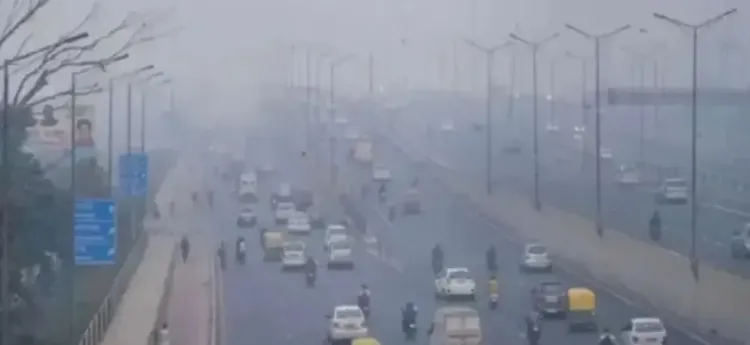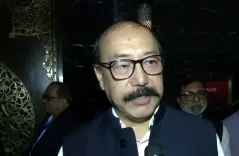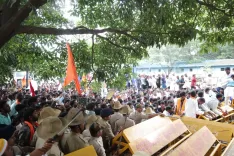GRAP-4 Measures Reinstated in Delhi-NCR as Air Quality Declines

New Delhi, Dec 17 (NationPress) Due to the increasingly poor air quality in Delhi on Monday evening, the Commission for Air Quality Management (CAQM) has been compelled to reinstate GRAP 4 restrictions across the whole Delhi-NCR region, effective immediately.
The average air quality index (AQI) for Delhi surged to 399 by 9 p.m. on Monday and exceeded the 400 threshold by 10 p.m.
This decline in air quality has pushed it into the 'Severe+' category, prompting an emergency meeting that led to the decision to bring back Stage IV of the Graded Response Action Plan (GRAP).
In an official statement, CAQM declared, "In accordance with the directives issued by the Supreme Court, the Sub-Committee hereby enacts Stage-IV of the Schedule under the GRAP, as thoroughly revised and issued on December 13, 2024, with immediate effect. The actions under Stage-IV will supplement those already in place under Stages III, II, and I."
The order referenced the Supreme Court's ruling, which stated that if the AQI exceeds the 350 mark, Stage-III protocols should be enacted, and if the AQI surpasses 400, then Stage-IV actions should be reinstated.
Previously, GRAP-III restrictions were also put back in place across the entire NCR as the AQI crossed the 350 threshold, attributed to "highly unfavorable meteorological conditions" and "other factors hindering pollutant dispersion."
The order further noted, "Air Quality parameters have deteriorated substantially due to a significant decrease in the mixing layer height and ongoing calm wind conditions over Delhi. The Sub-Committee on GRAP has been closely monitoring the air quality situation in Delhi."
"The Sub-Committee observed that the AQI level was perilously close to 400, being 399 at 9 p.m., and reaching 401 at 10 p.m., thus breaching the 400 mark," it added.
The CAQM, tasked with safeguarding and enhancing air quality in the NCR and surrounding areas, rolled out a revised strategy to tackle winter pollution on December 13.
In November, Delhi and nearby regions experienced severely toxic air, with air quality consistently falling into the 'severe' and 'very poor' categories, prompting annual health alerts from medical professionals.
In recent weeks, a panel of the Supreme Court, led by Justice Abhay S. Oka and Justice Augustine George Masih, has conducted several hearings regarding the air quality crisis in Delhi-NCR.
During these hearings, ineffective bans on polluting vehicles and issues related to stubble burning have been addressed.
The GRAP comprises a series of emergency protocols enacted in Delhi-NCR to combat air pollution, contingent upon the degree of air quality degradation.
Delhi continues to struggle with air pollution, as air quality indices remain in the 'very poor' category, posing serious health risks to its residents.
There is little expectation for an improvement in air quality in the near future.






